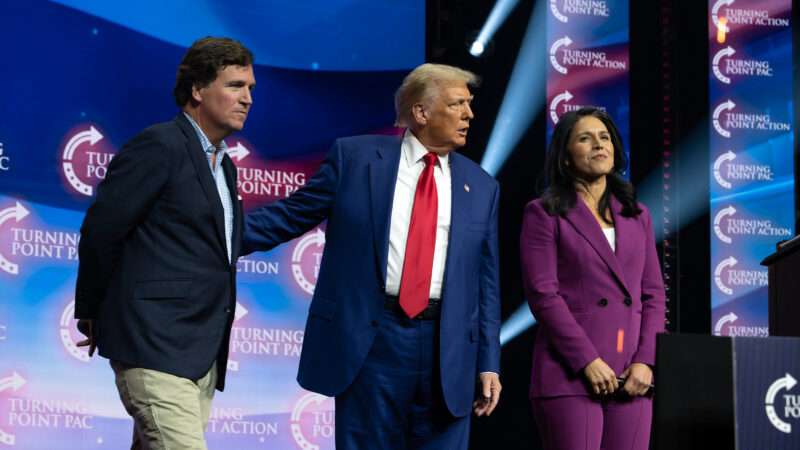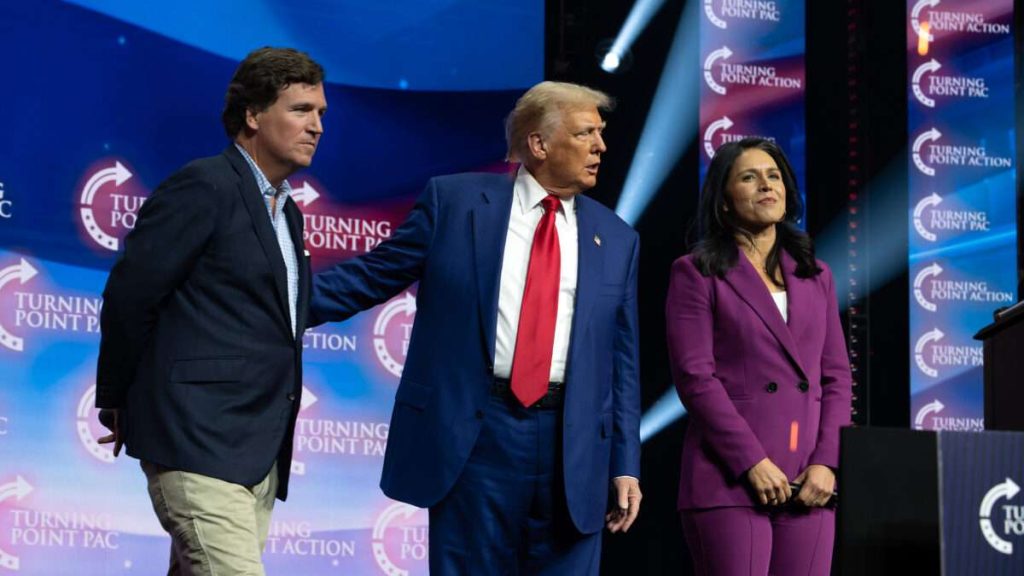
If President-elect Donald Trump gets his way, his National Security Council will be a very lively place to be. Michael Waltz, who would be chairing the council as National Security Adviser, has declared that there is “no peaceful solution in Syria as long as [Bashar] Assad is in power,” because Assad has “been gassing his own people for years.” But Tulsi Gabbard, who would be sitting in the meetings as Director of National Intelligence, has met the Syrian ruler in person, arguing that “Assad is not the enemy of the United States, because Syria does not pose a direct threat to the United States.”
That’s just one of the intense contradictions on display in the incoming second Trump administration’s foreign policy staff. Trump has flirted with both extremely hawkish and extremely dovish positions. And his staffing is similarly all over the place.
Many of Trump’s nominees are conventional war hawks. His secretary of state nominee, Marco Rubio, is open to regime change wars in Latin America. Brian Hook, running the State Department transition, is obsessed with regime change in the Middle East. Elise Stefanik, nominated as ambassador to the United Nations, and John Ratcliffe, nominated to run the CIA, also want more intervention there. Waltz, perhaps the most radical of them all, is on record supporting U.S. boots on the ground in Ukraine and a reinvasion of Afghanistan.
But on Wednesday, Trump nominated some surprising antiestablishment figures: Rep. Matt Gaetz (R–Fla.) for attorney general and former Rep. Gabbard (D–Hawaii) for director of national intelligence, which oversees the U.S. government’s 18 intelligence agencies. Gaetz has pushed to restrain the President’s war powers under both Democratic and Republican administrations. Gabbard is an outspoken opponent of U.S. regime change efforts—both through military force and economic sanctions—in the Middle East. In 2018, when Trump was considering attacking Iran in defense of Saudi oil fields, Gabbard urged not to be “Saudi Arabia’s bitch.”
Gaetz and Gabbard are both going to face a hard Senate confirmation battle. Several Republican senators have come out as skeptics of Gaetz for reasons unrelated to foreign policy; he’s been investigated for sexual misconduct and sparked a Republican civil war over his successful effort to overthrow former Speaker of the House Kevin McCarthy. Gabbard, meanwhile, has gone further than most other foreign policy critics would. It’s one thing to say that Assad is not a threat to America and another to meet him in person.
At first glance, Trump’s pick for secretary of defense, Pete Hegseth, is another dyed-in-the-wool neocon. He came up in politics as a leader in Vets for Freedom, a veterans’ organization that wanted to keep the Iraq War going. At a rally for John McCain during the 2008 presidential elections, Hegseth praised McCain for being “willing to stick his neck out for an unpopular war” and argued that “Iraq is the central battlefront in a larger battle against radical Islam.”
And when Trump ordered the assassination of an Iranian general in 2020, Hegseth was cheering for a full-on war with Iran. “None of this changes the calculation of this regime, which is an evil regime,” he fumed on Fox News, arguing that the United States needs to attack Iran’s nuclear sites, military headquarters, and industrial infrastructure. “We can’t kick the can down the road any longer,” Hegseth warned.
But more recently, Hegseth claimed that his views have changed.
Leaving Saddam Hussein in power was perhaps “a better idea than overturning the whole apple cart and welcoming Iran into Iraq,” Hegseth said in a November 7 interview with the Shawn Ryan Show. “I heard people making those arguments, which I didn’t like, people I didn’t like. I just had to dismiss them at the time because I was a believer in the mission that was in front of us at the time, but in retrospect, we have burned two decades of money, our best and brightest, our good will, military capabilities, strategic drift in Afghanistan and Iraq.”
Then again, it’s easier to agree that the last war was a mistake than to oppose the next one. (Just ask Democrats.) Like others in the “peace through strength” camp, Hegseth has no problem arguing that it’s just different this time. “I understand [attacking Iran is] not a popular idea. I don’t want boots on the ground. I don’t want endless war. I don’t want occupation. But Iran has been in an endless war with us for 40 years,” Hegseth claimed during his 2020 interview with Fox News.
Gaetz and Gabbard, by the way, have also carved out their own loopholes in the Middle East. Gabbard, who told The Intercept in 2018 that she supported “very limited” counterterrorism campaigns, has come out in full-throated support of Israel’s war in the Palestinian territories, accusing American antiwar protesters of being “puppets” of a “radical Islamist organization.” And Gaetz has backed President Joe Biden’s deployment of U.S. combat troops to Israel, telling Reason that because “our troops are already there,” the new deployment is simply a matter of “force protection.”
One more figure has emerged as a potential foreign policy dark horse. Billionaire businessman Elon Musk, who Trump has brought into the White House as an adviser on government efficiency, secretly met with an Iranian diplomat on Monday, according to The New York Times. The Iranian side told the Times that it was a “positive” meeting on how to reduce tensions in the Middle East. That’s not unprecedented; the Obama administration’s own diplomacy with Iran started through an Omani businessman who wanted to try an “out-of-the-box approach” to preventing war.
It’s possible that Trump’s more hawkish advisers—and the rivalries between them—strangle this diplomacy in the cradle, as they did during the first Trump administration. Former National Security Adviser John Bolton aggressively sabotaged Trump’s efforts to prevent a war with North Korea. Meanwhile, Hook at the State Department nearly derailed a Bolton-backed hostage exchange with Iran.
The eclectic voices in the new administration might be more successful at winning Trump’s ear. Personnel is policy, as they say, and the policy so far is quite confusing.
The post Meet Trump’s Incredibly Confusing New National Security Cabinet appeared first on Reason.com.





